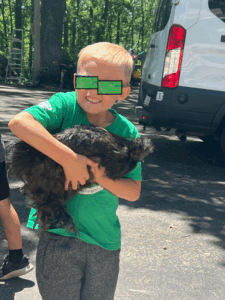
If you’re considering becoming a Wisconsin foster parent, you might imagine that parenting a foster child is much like parenting any other child, just with a bit more patience and compassion. You might believe that "love is enough". But the truth is, foster parenting often requires an entirely different mindset. It isn’t just about providing a loving home; it’s about helping a child heal.
Healing takes time and requires our dedicated foster parents to use a very different approach. Treatment foster care offers children a place to heal while foster parents use trauma-informed skills.
Children in care with CCR have experienced early trauma, neglect, or abuse. They haven't had consistent, attuned caregiving that builds a child’s sense of safety, trust, and self-worth.
As a result, foster children often present as younger than their age, especially emotionally. For instance, a ten-year-old may seem like a six-year-old in terms of emotional regulation, or a teen may struggle with trust and boundaries in ways that seem more appropriate for a much younger child.
That’s not immaturity. That's not a kid being difficult. That’s survival.
Think for a moment about how babies learn to understand themselves and the world. A newborn doesn't know the difference between hunger, tiredness, or discomfort. All it knows is that something feels wrong. So, it cries.
In a healthy situation, a caregiver responds — checks the diaper, offers a bottle, gives a cuddle, and wraps the baby in a blanket. Over time, the baby begins to associate that uncomfortable feeling with the relief that comes from a responsive adult. This cycle, repeated thousands of times, teaches the child:
This is the foundation of secure attachment and emotional development.
Now, imagine a child whose cries were met with yelling. Or were ignored. Or maybe sometimes helped, but other times they waited and waited for someone to come. Perhaps no one came at all. Or maybe another child — a sibling — tried to meet their needs, doing their best, but missing the mark.
This child learns a very different lesson:
These children often live in a state of heightened alert. They may seem overly independent, always trying to control situations or keep others at arm’s length — because in their experience, adults aren’t safe. They may resist comfort, struggle with transitions, or act out in confusing ways. This isn't “bad behavior.” This is survival behavior.
Therapeutic parenting is about seeing beyond the behavior to the need underneath. It means responding not with consequences or punishment, but with connection, structure, and predictability — again and again and again.
It means recognizing that many foster children start from a very different place than their peers. Two children may be the same age, but their inner worlds — their expectations of others, their sense of safety — may be worlds apart.
As a foster parent, you are helping that child rewrite their internal story:
But it takes time. And it takes a lot of repetition. Sometimes, children will test your consistency, not because they’re being difficult, but because they need to see if you’ll still be there when things get hard. They will test you and push buttons to get a reaction to gauge your commitment.
Foster parenting isn’t just about offering a child a loving home. It’s about providing them a new model of what it means to be cared for — what it means to be safe. You are helping a child who may never have known what a genuine connection feels like to finally begin to trust again.
And while it may not look like traditional parenting, it is powerful parenting. It’s slow, patient, deeply intentional work. But it can be life-changing — for the child, and for you. Since 1989, we have seen thousands of kids begin to heal because their foster parents used a different approach, using learned trauma-informed parenting skills.
Thinking about fostering?
Fostering a child or siblings with CCR could be one of the most meaningful journeys you ever embark on. Our foster parents are doing great work, but they depend on a team approach and 24/7 support. That's what we do best.
We always need more foster parents for kids ages 2-18. With an open heart and an open mind, you can help a child feel safe, learn to trust, and begin to heal. CCR foster parents provide long-term care, typically 12-18 months, for kids and youth with trauma histories. We would love to get you started on your fostering journey.
Please contact us to learn more about CCR and the kids needing your help.